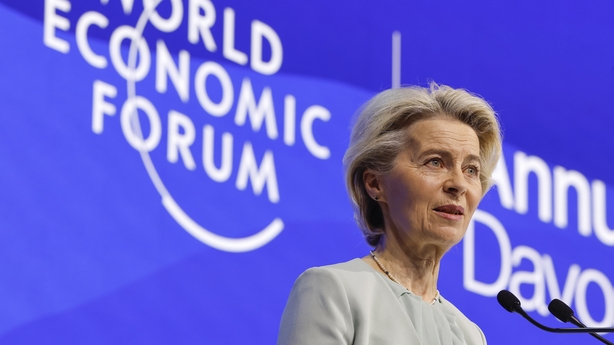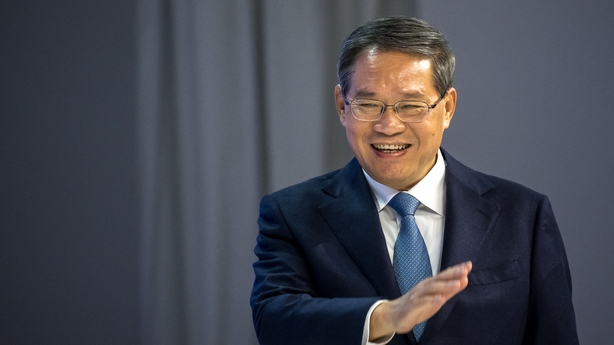Ukrainian President Volodymyr Zelensky courted the global elite at Davos with a mix of dire warnings and notes of hope, as fears grow over the future of Western support against Russia.
After addressing the World Economic Forum by video in previous years, Mr Zelensky flew to the Swiss mountain resort as he warned that 2024 will be critical to defeating the Russian invasion.
Nearly two years since the invasion, Mr Zelensky faces growing uncertainties with the US Congress deadlocked on sending more weapons, European powers increasingly impatient and the looming threat of the return of Donald Trump, who has dismissively rejected aid to Ukraine.
He insisted that questions on support were "only a matter of weeks" and said, "I believe we can also manage the question of aid in Congress."
"Ladies and gentlemen, this year must be - must be - decisive," he said.
Mr Zelensky met with US Secretary of State Antony Blinken, who promised that the United states will "sustain our support" despite the question marks in Congress.
In his address, he rejected the prospect of freezing the conflict with Russia, which failed at a swift takeover in February 2022 but has largely succeeded in repelling a major Ukrainian counteroffensive in the east.
"Any frozen conflict will eventually reignite," he said.
He noted that Germany and France had been guarantors of the earlier Minsk diplomatic process following incursions in 2014 by Russia, which seized the Crimean peninsula.
Calling Russian President Vladimir Putin a "predator" who will not be satisfied, he said he doesn't "believe that Putin is capable of changing because only humans can do that".
He nonetheless voiced openness to peace negotiations, albeit on Ukraine's terms.
He was clear that peace would still mean retaking territory seized by Russia.
Mr Putin retorted that Moscow's forces had the upper hand, telling Kyiv its counter-offensive has failed and "if this continues, Ukraine's statehood could be dealt an irreparable, very serious blow."
Expanding on his previous proposals for a global summit, he said it could take place in Switzerland at the level of leaders.

"I invite every leader and country that respects peace and international law to join us," he said.
Some 80 national security advisors met in Davos on Sunday to discuss the peace initiative, an amorphous concept backed in part by Saudi Arabia on behalf of non-Western states concerned by the conflict.
Earlier, European Commission chief Ursula von der Leyen said that the West must not let up supplying Ukraine with weapons and money if it wants Kyiv to succeed in its war.
"Ukraine can prevail in this war but we must continue to empower their resistance," she told business leaders at the World Economic Forum (WEF) in Davos, urging Kyiv's western allies to continue their arms deliveries and financial support of Ukraine.
"Ukrainians need predictable financing throughout 2024 and beyond. They need a sufficient and sustained supply of weapons to defend Ukraine and regain its rightful territory."
Kyiv has been scrambling to ensure financial support does not waver for Ukraine during the biggest war in Europe since World War II, as the world's attention has swayed to the Middle East amid fears of a spillover from the conflict in Gaza.
Chinese Prime Minister Li Qiang is also in Davos, where China will put on a show of force with a large delegation represented by Mr Qiang.
Mr Li addressed global and business A-listers at the forum, who descend there every year for a week of serious talks and schmoozing.
Mr Li will be the most senior Chinese official to attend Davos since President Xi Jinping in 2017.

He will be joined by Chinese Commerce Minister Wang Wentao, the governor of the People's Bank of China and high-ranking representatives from other ministries including Deputy Foreign Minister Ma Zhaoxu.
Mr Li will hold talks with Ms von der Leyen, but it is not yet clear if he or the deputy foreign minister will meet US Secretary of State Antony Blinken.
His speech will be closely followed after tense presidential elections at the weekend in Taiwan, the democratic island that Beijing claims as part of China.
After self-ruled Taiwan's president-elect Lai Ching-te welcomed an American delegation following his election victory, China hit back that it was "firmly opposed" to all official exchanges between the US and Taiwan.
Ukraine's finance fears
Li and Mr Zelensky are among 60 heads of state and government attending Davos, including Middle East leaders, joined by 800 chief executives among a total of 2,800 participants.
Other key speakers include NATO head Jens Stoltenberg. Ms von der Leyen will also hold private talks with Mr Zelensky as well as Mr Blinken and Hungarian President Katalin Novak.
European Union leaders will hold talks next month in a bid to approve a €50 billion aid package for Ukraine that was vetoed in December by Hungary.
The US envoy for Ukraine's economic recovery, Penny Pritzker, said the country was facing a "tough moment" and acknowledged "a lot of uncertainty as it relates to the US and EU assistance", but said Washington had offered reassurances to Kyiv.
"They worry about a distracted international community and that the international community might lose faith," she said during an event yesterday.
Republicans in the US Congress are blocking a renewal of US military assistance for Ukraine, and Kyiv and its allies worry about reduced support if Donald Trump wins the US presidential election later this year.
Politicians and business leaders will discuss how to build consensus on a multitude of risks worldwide including climate change and a cost-of-living crisis.
Attendees will also grapple with how to maintain global trade after attacks by Yemeni rebels in the Red Sea disrupted the key conduit for Asia-Europe shipping.
Tech on the stage
Artificial intelligence will also dominate discussions after last year's flurry of examples demonstrating the technology's dizzying advances.
Despite the excitement, there are worries about the threats posed by AI.
Misinformation and disinformation driven by AI ahead of elections in countries, including the US, are the biggest global risks this year and next, the WEF said last week.
Ms von der Leyen told Davos "Europe must up its game" on artificial intelligence, as the bloc readies landmark legislation to curb possible AI abuse.
"Our future competitiveness depends on AI adoption in our daily business. And Europe must up its game and show the way to responsible use of AI," she said.
The EU is currently working on a draft AI Act that it views as a possible template for regulation in other parts of the world for the fast-moving technology.
In December, its member countries and EU lawmakers reached agreement on the text which seeks to rein in potential AI misuse - such as its use for biometric surveillance and manipulation of behaviour - while fostering innovation in the sector.
Ms von der Leyen said she was a "tech-optimist" and said "AI is also a very significant opportunity, if used in a responsible way," with its projected ability to boost productivity and economic growth.
AI breakthroughs are currently being led by the United States, home to ChatGPT-maker OpenAI, with China close behind.
Europe does not want to be left in the digital dust and has ambitions of growing its own AI champions, encouraging companies such as Germany's Aleph Alpha and France's Mistral AI as well as new ones.
But it wants regulatory "guardrails" to be quickly erected, especially with the risk of AI-fuelled disinformation during EU elections in June and the more general disruption AI is forecast to bring to many labour sectors and professions.
Ms von der Leyen promised that EU startups in the sector would have access to Europe's supercomputers - "similar to what Microsoft is doing for ChatGPT".
In the meantime, Brussels is already using its regulatory heft to make digital giants abide by EU protections for European businesses and consumers.
Last week, Ms von der Leyen's European Commission announced it had launched a preliminary study of Microsoft's $13bn investment in OpenAI to see it potentially could be a disguised merger.

